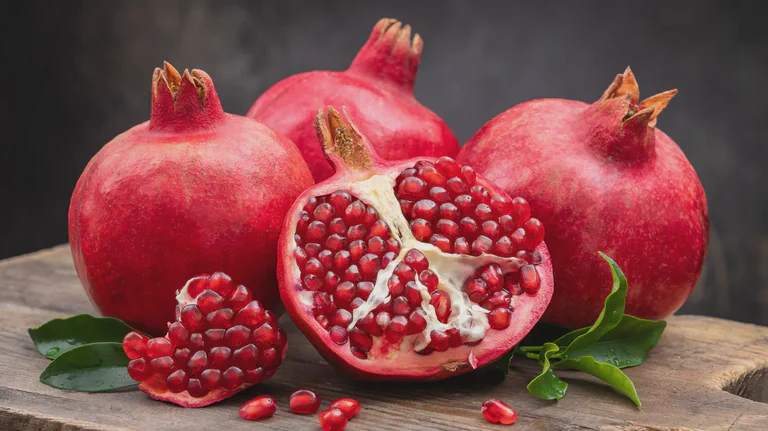Table of Contents
Key Takeaways
- Mitophagy Activation ⚡: Urolithin A (UA) stimulates mitochondrial quality control (mitophagy) via PINK1/Parkin and HIF-1α/BNIP3 pathways, clearing damaged mitochondria and supporting cellular energy production
- Gut Microbiome Dependent: Only ~40% of people produce detectable UA from ellagitannins; direct UA supplements bypass this limitation for more reliable dosing
- Pomegranate Husk Concentration: Husk contains significantly higher ellagitannins (71.9 mg/g) than arils (2.7 mg/g); typically discarded despite being the most beneficial part
- Clinical Evidence: Human trials support 500-1000 mg/day UA for improved muscle endurance in older adults and enhanced mitochondrial biomarkers
- Multi-System Benefits: Emerging research shows potential for brain health (Alzheimer's models), cardiovascular support, joint protection (osteoarthritis), and skin aging (UVB protection)
- Bioavailability Enhancement: Take with fatty meals; gut health optimization (prebiotics, fermented foods, diverse plants) may enhance endogenous UA production
- Research Gap: Limited patent potential restricts large-scale clinical trials; existing evidence shows promise but more research needed for definitive conclusions
The Discovery We're Throwing Away
In laboratories around the world, scientists are examining an interesting possibility: compounds that may support healthy aging could be hiding in our kitchen waste.
While pharmaceutical companies invest heavily in developing synthetic compounds, nature provides beneficial compounds that have been present in traditional foods for millennia. The challenge? One potent source comes from the part of the pomegranate we typically discard—the husk.
This isn't just another superfood story. This is about Urolithin A (UA), a compound that highlights an important aspect of modern medicine: we often overlook natural solutions that can't be patented or monopolized, despite emerging evidence supporting their benefits.
What is Urolithin A? The Science Explained
Urolithin A (UA) is a natural compound produced in your gut when beneficial bacteria digest ellagitannins and ellagic acid found in pomegranates—particularly concentrated in the husk that most people discard.
The Gut Conversion Factor
Here's what makes UA particularly relevant: studies show that only about 40% of people produce detectable levels of UA from ellagitannins in pomegranate juice, depending on their gut microbiome composition. This variability helps explain why nutritional studies often show inconsistent results and why personalized approaches to nutrition matter.
How UA Works: Biological Mechanisms
UA works through fundamental biological pathways that may support cellular health:
- Mitochondrial Quality Control: May stimulate mitophagy—clearing out damaged mitochondria and supporting cellular energy production
- Cellular Cleanup: May enhance autophagy, the body's system for removing cellular debris
- Inflammation Modulation: May help reduce chronic inflammation at the cellular level
- Cellular Energy: May improve mitochondrial function and energy metabolism
The Overlooked Resource: Pomegranate Husk Benefits
While most people enjoy the juicy pomegranate seeds, the husk (peel) is often discarded. This is where significant concentrations of beneficial compounds are found:
Nutrient Concentration
The husk contains significantly higher concentrations of ellagitannins (up to 71.9 mg/g) compared to the edible arils (approximately 2.7 mg/g), making it a concentrated source of UA precursors.
Potential Benefits
- Enhanced UA Production: May support your gut's ability to produce this beneficial compound
- Digestive Health: Rich in dietary fiber that feeds beneficial gut bacteria
- Antimicrobial Properties: Contains compounds that may help balance gut microbiota
- Cellular Protection: Antioxidants may help protect against oxidative stress
- Cardiovascular Support: May support heart health through improved endothelial function
Key Research Findings
Note: Research on Urolithin A is ongoing. Many findings come from preclinical studies, and human trials continue to investigate its effects. The following represents emerging evidence rather than conclusive clinical recommendations.
Brain and Cognitive Health
Emerging research (2021-2024) suggests UA may:
- Support mitochondrial function in brain cells
- Help reduce oxidative stress associated with neurodegeneration
- Improve cognitive performance in animal models of Alzheimer's disease
Human trials for Alzheimer's applications are ongoing, and more research is needed to confirm these benefits in people.
Heart and Cardiovascular Health
Studies (2023-2025) indicate UA may:
- Support mitochondrial quality in cardiac tissue
- Enhance cellular energy production in heart cells
- Improve markers of cardiovascular health in aging models
Joint and Mobility Support
Research (2022-2025) shows UA may:
- Support mitochondrial health in joint tissues
- Help reduce cartilage degeneration in osteoarthritis models
- Alleviate discomfort associated with joint aging
Skin Health and Aging
Clinical trials (2023-2025) demonstrate topical UA may:
- Support skin mitochondrial function
- Help protect against UVB-induced skin damage
- Improve markers of skin aging in human studies
Muscle Function and Endurance
Recent human trials (2023-2025) suggest UA supplementation at 500-1000 mg/day may:
- Improve muscle endurance in older adults
- Enhance mitochondrial biomarkers associated with cellular energy
- Support healthy muscle function during aging
Practical Implementation
How to Use Pomegranate Husk
Instead of discarding this beneficial source of compounds:
- Powdered Form: Dry the husk and grind into powder for smoothies, yogurt, or oatmeal
- Tea Infusion: Steep dried husk pieces in hot water for nutrient-rich tea
- Supplementation: High-quality pomegranate husk extracts in capsule form
- Food Preparation: Incorporate into recipes that benefit from tart flavor
Safety Note: Always wash pomegranates thoroughly to remove pesticides before using the husk. Consider organic sources when consuming the peel.
Dosage Recommendations
Current evidence suggests:
- UA Supplements: Clinical trials support 500-1000 mg/day of UA for mitochondrial benefits
- Starting Dose: Begin at 500 mg to assess tolerance
- Pomegranate Husk: 500 mg to 1 gram of powder daily (precise UA content varies)
- Consistency: Regular intake may be more effective than occasional use
Safety Profile: UA is generally well-tolerated up to 1000 mg/day. Mild gastrointestinal effects may occur in some individuals.
Gut Health Optimization
Since gut bacteria determine UA production, supporting a healthy microbiome may enhance benefits:
- Prebiotic Foods: Garlic, onions, leeks, bananas, asparagus
- Fermented Foods: Yogurt, kefir, sauerkraut, kimchi
- Diverse Plant Foods: Aim for 30+ different plant foods weekly
- Limit Unnecessary Antibiotics: Preserve beneficial bacterial balance
Delicious Ways to Incorporate Husk
- Pomegranate Husk Tea: Steep 1 tsp dried husk with honey and lemon
- Smoothie Boost: Add 1/2 teaspoon husk powder to your favorite blend
- Yogurt Topping: Sprinkle over yogurt with berries and nuts
- Energy Bars: Incorporate into homemade snack recipes
Quick Recipe: Pomegranate Husk Smoothie - Blend 1/2 cup yogurt, 1/4 cup pomegranate seeds, 1/2 tsp husk powder, 1/4 banana, and almond milk.
Evidence Snapshot: Common Questions About UA
"Does UA actually work in humans?"
Emerging Evidence: Human trials show UA at 500-1000 mg/day improves muscle endurance and mitochondrial biomarkers. However, research is ongoing, and not claims apply to all individuals or conditions.
"What if I don't produce UA from food?"
Reality: Approximately 40% of people don't produce detectable UA from precursors. Direct UA supplements bypass this limitation, which is why supplements are often more reliable than food sources.
"Is UA just another antioxidant?"
Scientific Distinction: UA works through specific pathways (mitophagy, autophagy) rather than direct antioxidant action. Its mechanism is fundamentally different from simple antioxidants like vitamin C.
"Why isn't UA widely recommended?"
Systemic Factors: Natural compounds without patent potential receive less research funding and marketing attention. This doesn't mean they're ineffective—it reflects commercial rather than scientific priorities.
The Research Gap: Why We Know Less Than We Should
The Commercial Barrier
UA illustrates a fundamental challenge in medical research:
- Limited Patent Potential - Natural compounds can't be exclusively owned
- No Prescription Model - Patients can access through diet or supplements
- Competes with Profitable Treatments - Addresses root causes rather than requiring ongoing medication
- Lifestyle Integration Required - Unlike passive pharmaceutical approaches
This creates a structural disincentive for large-scale clinical trials, despite promising preliminary evidence.
The Evidence We Do Have
While large phase III trials are scarce, the existing research includes:
- Multiple peer-reviewed studies in reputable journals
- Emerging human clinical trials on muscle and mitochondrial function
- Preclinical evidence across multiple health domains
- Good safety profiles in studies to date
Who May Benefit Most?
Based on current research, UA may be particularly relevant for:
- Adults over 50 experiencing age-related muscle decline
- Individuals concerned about mitochondrial health and cellular energy
- People with family history of neurodegenerative conditions (preventive approach)
- Those seeking to support healthy aging through evidence-based nutrition
- Individuals with osteoarthritis looking for complementary approaches
Important Considerations
Not a Miracle Cure
UA is a promising compound, but it's not a magic bullet:
- Benefits are modest and cumulative, not dramatic
- Works best as part of a comprehensive health approach
- Individual responses vary significantly based on genetics and microbiome
- Should complement, not replace, conventional medical care
Quality Matters
When choosing UA products:
- Look for third-party testing and verification
- Check for standardized UA content
- Research manufacturer reputation
- Consider direct UA supplements vs. precursors
The Bigger Picture: What UA Reveals About Health Research
The story of Urolithin A highlights important patterns in modern healthcare:
- Commercial interests influence research priorities - Patentable compounds receive more attention
- Natural solutions are often overlooked - Despite promising evidence
- Personalized responses vary widely - Gut microbiome composition significantly affects outcomes
- Prevention receives less funding - Than disease treatment
Key Takeaways
- UA is a promising compound that may support mitochondrial health, muscle function, and healthy aging
- Only ~40% of people produce detectable UA from food sources; supplements may be more reliable
- Clinical evidence supports 500-1000 mg/day for mitochondrial benefits
- Pomegranate husk is a concentrated source of UA precursors, though direct supplementation is more predictable
- Research is ongoing - More human trials are needed to confirm benefits across different health conditions
- Systemic factors limit awareness - Natural compounds without patent potential receive less research attention
The Urolithin A story represents more than just another health discovery—it's a case study in how commercial priorities shape which therapies receive research attention and medical adoption. The evidence suggests UA may offer meaningful benefits for healthy aging, but the lack of patent protection limits the incentives for large-scale clinical trials. This doesn't diminish the science—it highlights the need for more public research funding into natural compounds that could transform preventive healthcare.
Disclaimer: This article is for informational purposes only and is not a substitute for professional medical advice. Consult a healthcare provider before making significant changes to your diet or taking new supplements, especially if you have underlying health conditions or are taking medications.

